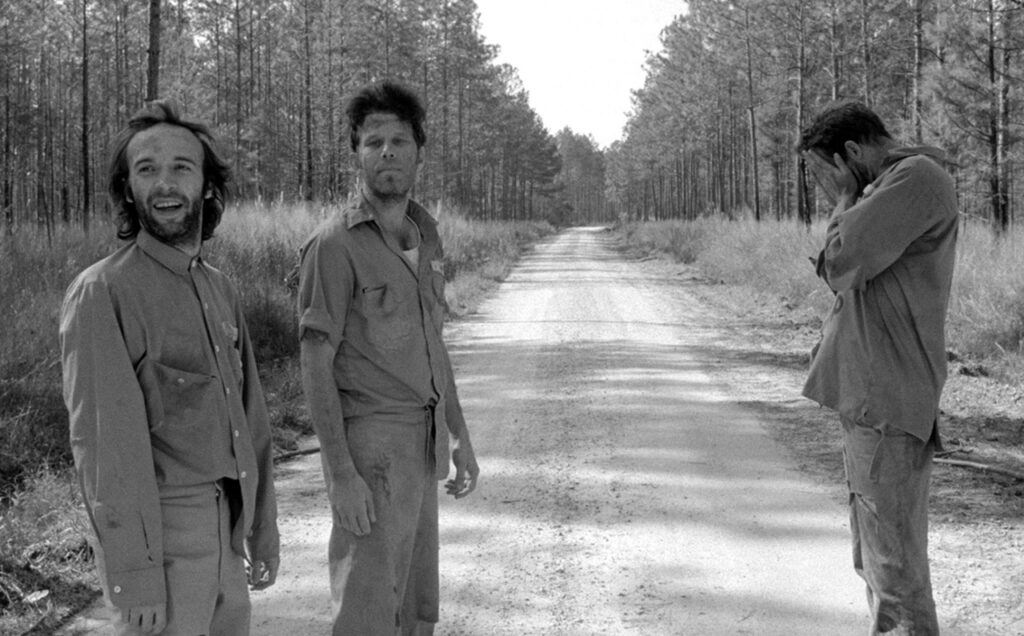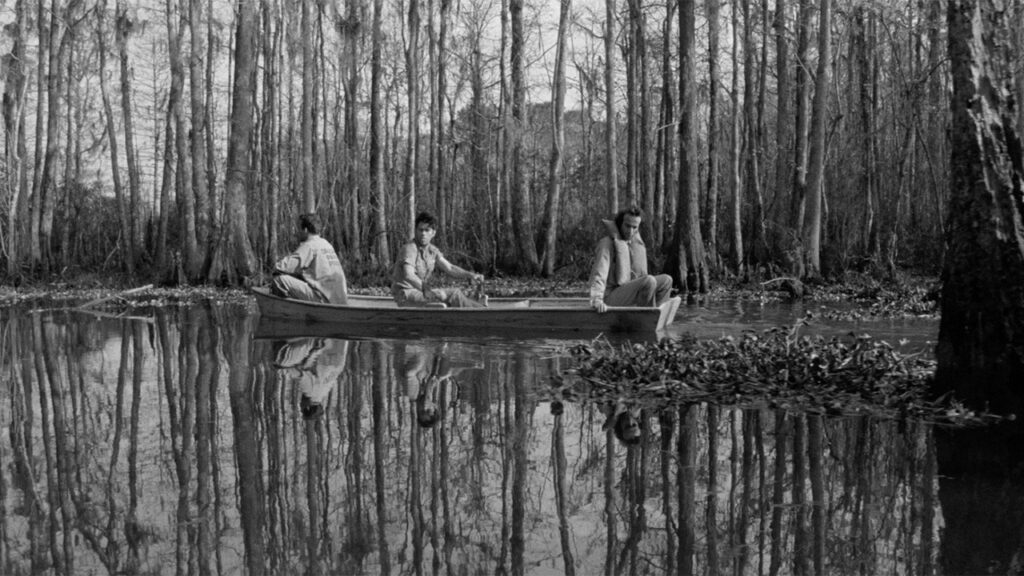| Jackson Stern |

Down by Law plays in glorious 35mm at the Trylon Cinema from Friday, November 14th, through Sunday, November 16th. For tickets, showtimes, and other series information, visit trylon.org.
Some of the best songs you can listen to when you’re at your lowest are the loneliest ones. When I was near the end of high school, I got my heart broken in a few different ways, like a lot of people do at that age, and I’d go for these long drives. Almost every day after school for a few months in the winter, I’d cross the threshold between the bleak plains of Wisconsin and the melancholic pines of Minnesota and soak in my feelings like blood in the snow. I’d usually drive down to Red Wing (which just has a feeling to it that I’ve never gotten from any other town I’ve been through) before pivoting up all the way through Minneapolis then back across the border home. These drives, constant and redundant, would’ve been rendered obscure in my mind if it wasn’t for my finely curated musical selections that would soundtrack them.
Blood on the Tracks by Dylan was my go-to album as it had the perfect combination and heartfelt regret and chilly bitterness that I found comforting. When I was through with feeling angry though, I found myself gravitating more and more toward early Tom Waits, especially his debut album, Closing Time. Few pieces of art that I can think of have so perfectly evoked the feeling of coffee and cigarettes, of festering in your feelings as the bar’s neon “OPEN” sign illuminates against your silent tears. It’s a lonely album—but comforting too, in a way. It’s saying, “We’ve all been there, kid.” And sometimes, that, along with the steady sights of a Midwestern sunset, is all it takes to start healing. These same exact feelings were evoked when, around that same period, I dove into the films of American cinema’s favorite troubadour, Jim Jarmusch, but especially in his third feature, Down By Law.
It’s difficult, for me anyway, to explain what makes this film so special. When you describe it, what it looks like, or even on the surface level how it feels, it kind of seems like some sort of exercise in miserablism. Shot in monochrome, every frame of Robby Müller’s photography is imbued with a sense of isolation. Whether its backdrop is the foreboding trees of a Louisiana swamp, the empty streets of a small city, or the cold walls of a prison cell, every image is distinctly uncrowded and the pace of them could hardly be described as speedy. Yet, it’s not a miserable film at all. If anything, by its end, it feels like a warm hug in the midst of a rainstorm. While there’s still a sense of lethargy in the air, you feel lightened in the same ways as the small relief of the sympathetic trumpet at the end of Closing Time’s title track.
Down By Law begins as a story about bad luck. Zack (Tom Waits) is a downtrodden DJ who’s just been broken up with and is imprisoned for a crime he didn’t commit. Similarly, Jack (John Lurie), a pimp, is framed for allegedly employing a teenage girl, though it was a set up. The two meet in prison and share a cell, in which they immediately butt heads. To complicate things further, an Italian tourist named Roberto (Roberto Benigni) ends up stuck with them in this concrete box from which they get the urge to escape. What unites these three very different men is, what else, loneliness. Each of them seems to be separated by something and each represents a different attitude towards this isolation. Zack is dejected whereas Jack is brutish and overly confrontational. To bounce off both of them, Roberto is optimistic, a foreigner in search of an American dream to live in. This setup makes it sound like a volatile chemical experiment of a comedy, a sort of “odd couple” (or, in this case, throuple) pairing that’s a setup for screwball antics. Instead, what Jarmusch gives us is something much more singular. Sure, there are great, pretty classic bits of humor to be found here but the real heart lies in the petty disagreements and the camaraderie that develops between these three men.

Crucially, it takes a great while for this film to get going and that is if you would consider this movie to really ever “get going.” I say crucially because it’s the long stretches where “nothing happens” that we the audience are attuned into this world. Shots linger for longer than most movies would ever dare, but as they say, “few images are as palpable as a sad Tom Waits sitting on a curb staring off.” The specific type of patience this film has turns itself from a narrative and even that of a mood piece into something more: a state of mind. It’s not that you really learn all that many tangible facts about these characters. But, very quickly, you learn how they feel just by the way they carry themselves and by the specific words they use. It’s easy to find yourself in all three of them. The first half feels almost meditative, easing us into this hollowed out world that our characters occupy. Empty streets, empty woods, empty prisons where we’re not even shown any other inmates besides our central trio. The back half definitely opens up and feels a lot lighter, only because we’re comfortable with these guys and it’s very heartening to watch them grow more comfortable with each other, even as they bicker and argue about petty things while Roberto just sits there with a goofy smile on his face. Most of the deadpan, dry-as-a-desert humor that Jarmusch is known for emerges. The film flirts with absurdity (mostly in the comedic timing of certain events and in the way the world of the film feels severed from our own) but it never stumbles into it which makes the few moments of heightened coincidence feel less like convenience and more like a symptom of this grounded world that acts without our character’s consent.
As the film begins its gentle fade out in the last twenty odd minutes, the lyricism of it all hastens its fade in. Our characters, who once argued and bickered, seem much more comfortable with each other than we’d ever imagine them being and by the end, the audience members themselves feel a part of their oddball little friend group that operates a little like a family. As they drink and eat themselves silly in an unpredictable place with unpredictable company, we feel the relief, same as them, of coming in with new people in the form of some twisted kind of family unit. By this point, the audience has formed a sort of symbiosis with these characters and together they whisk away their loneliness in favor of being alone, together. It’s not necessarily comfort we all feel by a type of closeness nonetheless, a closeness that makes us feel that maybe even if we’re all due to separate some day, we’ll have the memories of each other and our good times in our hearts.
Down By Law, much like the finest music of Bob Dylan or Tom Waits, isn’t in the business of finding a cure for pain. It doesn’t teach us what it takes to find the pot of gold at the end of the great grey rainbow, nor does it lend us the true, physical warm hand of companionship that so many of us wish for. But it has sort of the same feeling as that long stretch of road from Red Wing to Minneapolis does, as those moments of quiet between each song. It does pull up a chair next to us, look us in the eye, and tell the bartender, “I’ll have what they’re having.” By the end of this magnificent film, we may still feel lonely—but we’ll no longer be alone.
Edited by Olga Tchepikova-Treon
